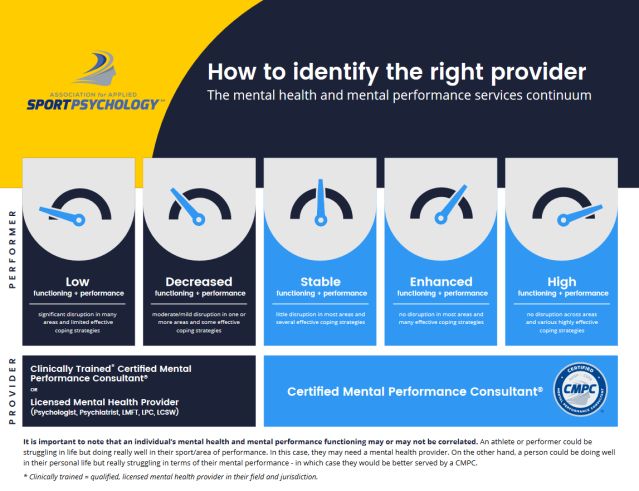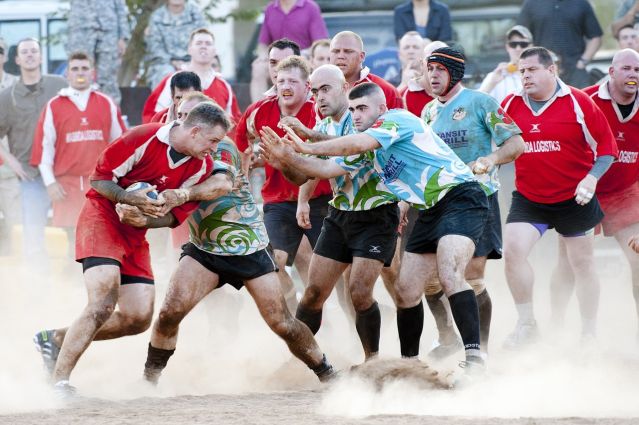Sport and Competition
What Is a Sport Psychologist?
The field of sport psychology continues to expand.
Updated November 3, 2023 Reviewed by Tyler Woods
Key points
- Sport psychologists operate in a variety of settings, from youth to professional sports.
- Sport psychologists work across the mental health and mental performance services continuum.
- In addition to individual and team work, sport psychologists operate in and serve broader athletic systems.
What do sport psychologists do?
Sport psychologists operate in a variety of capacities, including individual sessions with athletes that may reflect traditional therapy, scheduled performance consultations, or “sideline” interventions (i.e., providing immediate feedback in a natural sport environment). Sport psychologists may also offer crisis management to individuals, teams, and/or broader sport organizations as needed. Sessions with teams, including consultations, workshops, and educational interventions, are also a function of sport psychologists, as is observing teams in their natural practice/competition environments. Finally, sport psychologists may offer consultation to coaches and staff who work directly with athletes.
How to Identify the Right Provider
Sport psychology is a broad field that includes providers who work across the mental health and mental performance services continuum. These providers can be broadly categorized across licensed mental health providers (e.g., psychologists, psychiatrists, counselors, social workers) and Certified Mental Performance Consultants® (CMPCs), a designation given by the Association for Applied Sport Psychology. Clinically trained CMPCs possess both a mental health license and a CMPC. While clinically trained CMPCs or licensed mental health providers typically work with athletes at low and decreased levels of functioning and performance, CMPCs typically work with athletes that have stable, enhanced, or high functioning and performance. Education, training, license/certification, and continuing education requirements differ across provider designations.

Where Do Sport Psychologists Work?
While less common in traditional high school settings, sport psychologists can be increasingly found serving youth clubs and academies. More commonly, sport psychologists are hired by collegiate athletic departments—either as liaisons from university counseling centers or embedded entirely within athletics—to serve student-athlete mental health and performance needs specifically. Sport psychologists also work with professional athletes who are members of professional sport teams or the United States Olympic and Paralympic Committee (USOPC). Those working with professional athletes may do so as internal providers of professional sports teams, or private practitioners who are hired individually by athletes. Finally, sport psychologists can also be found operating as private practitioners in medical centers/hospitals (particularly rehabilitation settings) and in non-athletic settings such as the military, creative arts, and corporations—anywhere that elite performance is relevant outside of sport.
Working With Athletes
Athletes are a unique population that benefit from tailored services because they often perform in the spotlight and/or under a microscope. Athletes experience high levels of pressure to perform and, thus, possess many strengths in navigating high-pressure systems that may be useful in other realms of life. Grit (i.e., passion and perseverance for a long-term goal) is an example of a characteristic common among elite athletes that may translate into other areas of their lives (Thomsen & Olesen, 2020).

Typical Challenges for Athletes
Athletes face challenges related to mental health and interpersonal relationships similar to the general public. However, the unique pressures placed on athletes to perform can exacerbate existing mental health and interpersonal challenges (Reardon, 2019). In addition, athletes face challenges specific to their performance environment, including decreased athlete performance, maladaptive perfectionism, overtraining syndrome, injuries/surgery, and retirement from sport.
The Athletic System
In addition to individual and team work with athletes, sport psychologists operate in and serve broader athletic systems. These systems typically include athletic administrators, compliance officers, and coaching staff. Sport psychologists also often function as multidisciplinary members of sport performance and/or sports medicine teams. Sport performance teams may include strength and conditioning coaches, dieticians/nutritions, and sport scientists, whereas sports medicine teams are often composed of team physicians and athletic trainers. Importantly, each athletic system operates in its own way and may comprise more or less team members than described in this section.
References
National Collegiate Athletic Association (2022). NCAA student-athlete well-being study. Retrieved from: https://ncaaorg.s3.amazonaws.com/research/other/2020/2022RES_NCAA-SA-We…
Reardon, C. L., Hainline, B., Aron, C. M., Baron, D., Baum, A. L., Bindra, A., ... & Engebretsen, L. (2019). Mental health in elite athletes: International Olympic Committee consensus statement (2019). British Journal of Sports Medicine, 53(11), 667-699.
Thomsen, D. K., & Olesen, M. H. (2020). Elite athletes are higher on Grit than a comparison sample of non-athletes. Scandinavian Journal of Sport and Exercise Psychology, 2, 2-7.


